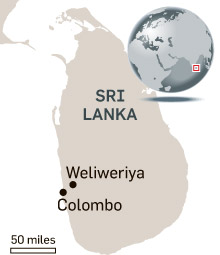by Nicola Smith, ‘Sunday Times,’ London, August 25 2013
RAVISHAN PERERA should have been preparing to enter university. Instead, on the day he was to sit his entrance exam, the 19-year-old was buried in his school uniform.
He was shot in the head on August 1 as Sri Lankan forces opened fire on a peaceful environmental protest in Weliweriya, a small town close to the capital, Colombo. The town, which donated blood to the army during Sri Lanka’s 26-year civil war, is in shock.
The bloody episode is cited as the latest example of violent repression that threatens to overshadow the Commonwealth leaders’ summit in Colombo in November.
Today Navi Pillay, the United Nations human rights commissioner, arrives in Sri Lanka, amid hopes she will address allegations that President Mahinda Rajapaksa’s regime has intimidated its opponents in the four years since the showdown with Tamil rebels that ended the civil war.
Perera was returning home to study when he was caught up in a demonstration that drew thousands of people on to Weliweriya’s high street. They were demanding action against water pollution allegedly from a nearby factory.
Protesters claim they had begun to disperse when a scuffle broke out between a young man and a senior army officer. Soldiers fired indiscriminately into the crowd.
 Their accounts appear to be backed by a video obtained by The Sunday Times, which shows soldiers advancing up the high street, taking aim at unarmed protesters. Perera and two others were killed and many others were shot. One group sought sanctuary in St Anthony’s Church, but soldiers broke its gate, shot out the lights, forced the people to kneel and, say witnesses, beat them with rifle butts and batons. A bloody bootprint was still visible last week in the church corridor where Nilantha Pushpakumara, 29, a night-shift worker, was said to have been beaten to death.
Their accounts appear to be backed by a video obtained by The Sunday Times, which shows soldiers advancing up the high street, taking aim at unarmed protesters. Perera and two others were killed and many others were shot. One group sought sanctuary in St Anthony’s Church, but soldiers broke its gate, shot out the lights, forced the people to kneel and, say witnesses, beat them with rifle butts and batons. A bloody bootprint was still visible last week in the church corridor where Nilantha Pushpakumara, 29, a night-shift worker, was said to have been beaten to death.
About 20 people who huddled in the small convent next door and prayed were saved by a nun who refused to move aside, even when a soldier allegedly put a gun to her chest.
Sources close to Perera, who were too frightened to give their names, said the last time he spoke to his mother he said he was trapped by gunfire.
Friends say she told him to stay where he was and come home in the morning, adding “God bless you”. In the morning she went looking for her son, but was told he was in hospital. The boy had been shot in the forehead.
A 16-year-old boy, Akila Dinesh Jayawardena, was also fatally shot. Brigadier Ruwan Wanigasooriya, an army spokesman, said an inquiry was under way. “The army did not act without provocation,” he said, alleging that petrol bombs had been thrown.
 The incident provoked an outcry, with the US State Department calling for an inquiry. Witnesses deny petrol bombs were thrown but admit that rocks were hurled after the army started shooting. “The army attacked unarmed civilians, but we don’t know who gave the order,” said Nimalka Fernando, a lawyer for the victims.
The incident provoked an outcry, with the US State Department calling for an inquiry. Witnesses deny petrol bombs were thrown but admit that rocks were hurled after the army started shooting. “The army attacked unarmed civilians, but we don’t know who gave the order,” said Nimalka Fernando, a lawyer for the victims.
Pillay’s visit follows a report earlier this year during which she urged an independent investigation of human rights violations at the end of the war, when up to 40,000 civilians were allegedly killed.
A UN panel appointed by Ban Ki-moon, the secretary-general, in 2011 said there were “credible allegations” that both Sri Lankan troops and Tamil Tigers had carried out atrocities and war crimes, although the government was responsible for most deaths. It denies this.
Suren Surendiran, a spokesman for the Global Tamil Forum, said that the Commonwealth summit would be an “opportune moment” to renew demands for an international inquiry.
Others fear that November’s conference, which will be attended by David Cameron and Prince Charles, will be a propaganda coup for the regime.
“I think it is ironic that the Commonwealth, having enshrined its values in a charter, holds a summit in a country whose government has violated practically all of these values,” said Paikiasothy Saravanamuttu from the Centre for Policy Alternatives.
Ananthy Sasitharan told how her husband Sinnathurai, a Tamil Tigers leader, had gone missing after he surrendered.
She and others claim they saw hundreds of Tamil Tigers give themselves up to the army after the final onslaught on their northern stronghold Mullaitivu in May 2009, several never to be seen again.
“On the night before my husband surrendered we knew for sure that he would be tortured but we hoped that he would be released later,” she said.
The army denies the accounts, claiming that anyone unaccounted for may have fled the country. “There is an entrenched culture of impunity,” said Yolanda Foster, Amnesty’s Sri Lanka expert.
In Weliweriya, people are fearful, but want answers. “We don’t want to fight with the government but we don’t expect justice either,” said a source close to the Perera family.